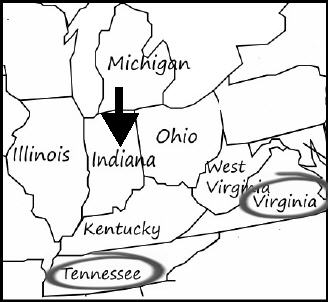It is illegal for first cousins to marry in Indiana unless both partners are 65 or over.
First cousins once removed and half first cousins are also prohibited unless they meet this age requirement.
Second cousins and more distant cousin relationships are allowed to marry.
This article reviews the important aspects of cousin marriage within the Hoosier State.
If you’re not familiar with half first cousins (or even first cousins once removed), we’ll explain them in full.

What Do The Indiana Marriage Laws Say About First Cousins?
The Indiana marriage laws have a rather simple statement relating to cousins.
Two individuals may not marry each other if the individuals are more closely related than second cousins.
Indiana marriage laws
However, the state has exceptions that allow some prohibited cousin relationships to marry. We’ll examine these in the next section.
Before we get there, let’s clarify relationships that are prohibited or permitted by the wording above.
The law prohibits marriage between first cousins, as this relationship is closer than second cousins. But that isn’t the only type of first cousin relationship that is ruled out.
First cousins once removed are not permitted to marry
The child of your first cousin is your first cousin once removed. This relationship is more closely related than second cousins.
If you need a more detailed explanation of the relationship, check out our article on first cousins once removed.
Half first cousins are also not permitted to marry
When two siblings only share one parent, we call them half-siblings. Their children are half cousins.
Basically, if your cousin’s parent is a half sibling of your parent, then you are half first cousins.
Half first cousins are also more closely related than second cousins. This means they are not permitted to marry (unless they can use the exceptions in the laws).
Exceptions To The Marriage Laws
Here is the clause that describes the exceptions.
… two individuals may marry each other if the individuals are first cousins and both at least sixty-five years of age.
Indiana marriage laws
Basically, if both partners are sixty-five are older, then they are allowed to marry.
What’s behind these exceptions?
Some states have a moral objection to first cousin marriage, full stop. They have no exceptions.
A small number of states have exceptions based on the age of the woman bringing her past child-bearing capacity, or whether either party is infertile.
Indiana seems to be relying on the woman being infertile through using a cut-off age of sixty-five.
If the concerns are on potential health risks to children, there’s no reason to apply a similar threshold to men in the relationship! It doesn’t make much sense, any way you look at it.
But it is what it is.
Types Of Cousins That Can Get Married In Indiana
Marriages between second cousins are allowed. Of course, more distant cousins are also permitted.
If you’re not sure what the difference is between the various relationships, the links below will give you diagrams and clear explanations.
Do Nearby States Allow First Cousins To Marry?
Indiana is bordered by Illinois, Kentucky, Michigan, and Ohio. None of these states allow first cousins to marry.
Tennessee and Virginia are probably the nearest options for first cousins to marry legally.

Check out these articles for further details:
Looking for a destination wedding spot?
Do you live in a state or country where first cousin marriage is legal and you simply wanted to visit Indiana as a destination wedding spot?
Consider these other states as alternative options in the region!
Looking to relocate?
Some first cousin couples move lock, stock, and barrel to another state where their marriage will be legal.
Review your options and future plans carefully. You may wish to sit down with an attorney to consider all the implications. Some states in the U.S. will not recognize legal marriages from other states.
Roman Catholic Marriages For Cousins In Indiana
Even if close cousins are both over sixty-five, they will face separate hurdles if they want a wedding in a Roman Catholic church.
Historically, the Catholic Church hasn’t encouraged first cousin marriages. However, the church laws have been relaxed somewhat in recent years.
There is a process that first cousins need to go through with the hierarchy in order to get permission to marry in a church ceremony. This is known as a dispensation.
You can read a more detailed explanation here on whether first cousins can marry in a Catholic church.
What about other cousins?
Second cousins (and further out) don’t need to get special permission for a Catholic Church marriage.
We suggest that you mention to your priest that you are second cousins before the service. This means he won’t get uneasy if he hears mention of “cousins” from other people.
If you’re not sure about whether you are first or second cousins, check out our article that uses clear infographics to explain what second cousins are.
Frequently Asked Questions
Here are some quick answers to common questions.
Does Indiana allow relatives to marry?
Indiana does not allow close relatives to marry.
More distant relatives such as second cousins are allowed to marry in the state.
Can you marry a sibling in Indiana?
Indiana does not allow siblings to marry. Half-siblings are also not allowed to marry in the state.
Is it legal to marry your second cousin in Indiana?
Marriage between second cousins is legal in Indiana.
Disclaimer
The codes and laws referenced in this article may not be the most recent version. Indiana may have more current or accurate information.
We make no warranties or guarantees about the accuracy, completeness, or adequacy of the information contained on this site or the information linked to on other sites. Please check official sources.